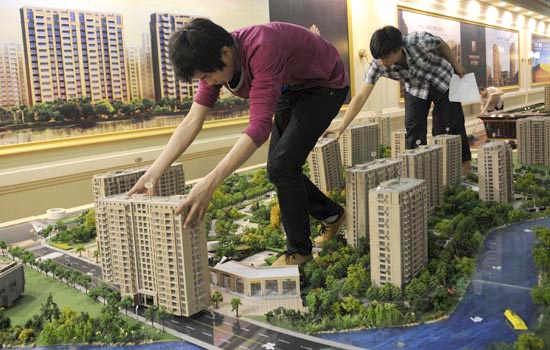
|
 |
|
Employees set up model apartments as they prepare a real estate exhibition in Hangzhou, Zhejiang province, in May. China's real estate investment grew 16.6 percent in the first six months of this year, compared to 32.9 percent in the same period last year. [Photo/Agencies] |
China's real estate investment growth slowed sharply in the first half of this year, dragging down the overall economy, as the central government pledges to maintain its curbs on the property market.
Real estate investment grew 16.6 percent in the first six months of this year, compared to 32.9 percent in the same period last year, the National Bureau of Statistics said on Friday.
This is also significantly lower than the year-on-year growth of 20.4 percent in fixed-asset investment, triggering concern that flagging real estate investment will further hamper the government's efforts to ramp up economic growth. Vigorous real estate investment was previously the driving force of the economy.
China's economy grew by 7.6 percent in the second quarter from a year earlier, the slowest pace since the first quarter of 2009, the bureau said.
Upon the release of the data, regulators seemed well aware of the negative effect of lackluster real estate investment on the economy.
"The slowdown in China's economy is due to the exacerbation of the external economic environment, the continuation of property control policies and weakening domestic demand," said bureau spokesman Sheng Laiyun.
But Sheng stressed that the strict controls on the property market will not be relaxed.
"Though the curbs on the property market will affect the economy in the short term, they will be conducive in the long run to the wellbeing of the macro economy, especially in preventing a real estate bubble," Sheng said.
A day earlier, a major regulator of China's land supply, the Ministry of Land and Resources, vowed to "resolutely" curb abnormal fluctuations in the real estate market.
The ministry said that the high land transfer prices that have reemerged in some areas in recent weeks did not alter the overall gloomy market situation.
It said that, in the first half of the year, land supplies dropped compared to a year earlier, and growth in land prices has also declined.
The drop in land supply was accompanied by the slowing pace of developers' land purchases, which fell 19.9 percent year-on-year in the first half, compared to a fall of 18.7 percent in the first five months of the year, said the bureau.
The bureau also said that newly started property construction fell by 16.3 percent in June from a year earlier, deepening from a fall of 4.6 percent in May.
Some industry observers attributed the slowdown in land purchases and newly started property construction - signs of developers' dampened enthusiasm - to the central government's strict property policies in place since last year.
The curbs restrict the number of homes each family can buy, requiring families buying a second home to pay a larger down payment and higher mortgage rates.
"The decline in newly started property floor space demonstrated the difficulty of developers' business and their gloomy market outlook. It made them cautious about buying land and delayed construction," said Yang Hongxu, deputy director of the Shanghai-based E-house China Research and Development Institute.
Yang warned that the curbs may result in a short supply of houses next year, thus pushing prices up again.


 Washington to remain focused on Asia-Pacific
Washington to remain focused on Asia-Pacific RQFII target blue chips amid bear market
RQFII target blue chips amid bear market Australian recall for top two exporters
Australian recall for top two exporters China fears new car restrictions
China fears new car restrictions